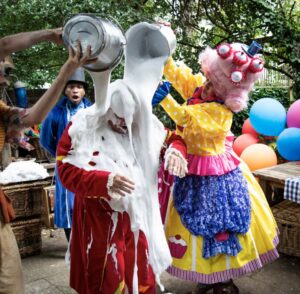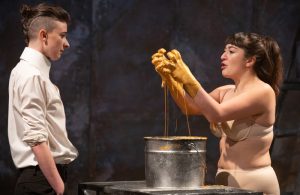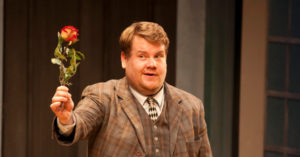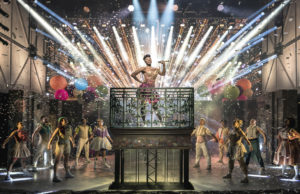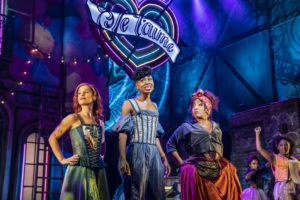Laughter and tears looking at the role of choice and chance in love
★★★★★

Constellations by Nick Payne at the Vaudeville Theatre is about the ups and downs of a relationship but it’s also about the choices the couple make, depending on the circumstances they are in at any given time or sometimes the mood they are in. So we see the same scenes again with different outcomes, and the potential to be very funny or desperately sad.
Throughout the multiverse of scenarios of false starts and alternative scenarios, and returning to earlier moments, there is a string that connects a linear story of a couple (played in the version I saw by Anna Maxwell Martin and Chris O’Dowd). They meet, form a relationship, split up after an affair, meet again and marry.
In one repeated scene, the man proposes using an analogy of bees. He first delivers his proposal in a stilted fashion, then stumbling, then smoothly.
The format is set from the start when, in a series of very short scenes, the relationship ends before it begins time after time, as each reveals a reason why they can’t get together, followed by a black out, until you are anticipating what the next obstacle will be. The funniest is probably when Chris O’Dowd ‘s previously single character says: ‘My wife’s getting me drink.’
It sounds confusing but it isn’t at all. It’s hard to praise the author enough such an ingenious construction that nevertheless remains watchable and funny.
The play is underpinned by the quantum mechanics-inspired theory that every time we do or don’t do something, a different version of the universe is triggered leading to an infinite number of parallel universes. This is illustrated by the love story between Marianne, a university researcher into quantum theory, and Roland a beekeeper, with indications throughout of how it could have gone differently. But what didn’t happen still informs our understanding of these characters and of what did happen in this particular story of two people who love one another but whose relationship also generates sparks.
And, in being made aware of the many possible outcomes, we inevitably ask how much if any free will is involved in our decisions? In this case, Nick Payne has made the decision to show us what happened when they stayed together, at least until a final choice of paths where, similar to Schrodinger’s cat being alive or dead, there is a one third likelihood of it going one way and two thirds the other. And, since the end is so sad, you also ask yourself whether one of the other paths we didn’t follow would have had a happier outcome.
So the play calls for two excellent actors, who can instantly change mood, and even situation, saying the lines with different intonation or swapping lines, and Anna Maxwell Martin and Chris O’Dowd are both actors of the highest order, with a great rapport, which is very important in linking the multiverse of outcomes we are presented with. They are also great comic actors to boot, which is important because there is much comedy.
In this revival by the Donmar Warehouse, being presented at the Vaudeville Theatre, there are four sets of couples playing the roles. It’s such a good idea to show how different actors of different ages and sexuality enhance the proposition that the characters’ story can be told in many different ways.
I wish I could have seen the others but I’m more than happy that I saw this pairing. Chris O’Dowd is not a regular on stage but he seemed so natural in his role as Roland. As we know, acting ‘natural’ is the hardest thing in the unnatural environment of a stage. He made his character laid back in a type familiar from his screen roles, but he could also be angry and upset as required, and he has a comic timing that any stage actor would be proud of.
Anna Maxwell Martin is a regular performer on stage and, while many of her roles have required her to be serious, she has a terrific comic streak. She can smile or be offhand, trot off an amusing line and hold just the right length of pause for laughter, and use terrific verbal dexterity then move on to a heartbreaking loss of the ability to speak properly. I am in awe of her acting skill.
This is the same production that originated at the Royal Court back in 2012 with the same director Michael Longhurst (Amadeus, Caroline Or Change). He must be credited with some of its success, not least the simplicity of the presentation, just the two actors at the front of the stage, with a background of balloons, representing perhaps a constellation of memories or even universes.
So space is apparently crowded by multiple universes but what about time? Well, that may not exist. The flitting back and forth through time- and (spoiler alert!) the play having visited the end of their story actually ends with a jump back to the middle. This, it’s pointed out, is how our own stories exist in our minds: not a linear cradle to grave, but little fragments from all over the years. All of our lifetime in our head. That includes false memories. For example, Roland remembers them meeting at a wedding when we know it was a barbecue.
And talking of time, so packed is Constellations with these short meaningful fragments, and the concentration required is so intense, that the play seems much longer than 70 minutes. Which is a tribute to the author and the actors.
The Donmar Warehouse production of Constellations, with performances by Anna Maxwell Martin & Chris O’Dowd alternating with Omari Douglas & Russell Tovey, continues at the Vaudeville Theatre until 21st September
Click here to watch this review on the One MInute Theatre Reviews YouTube channel








